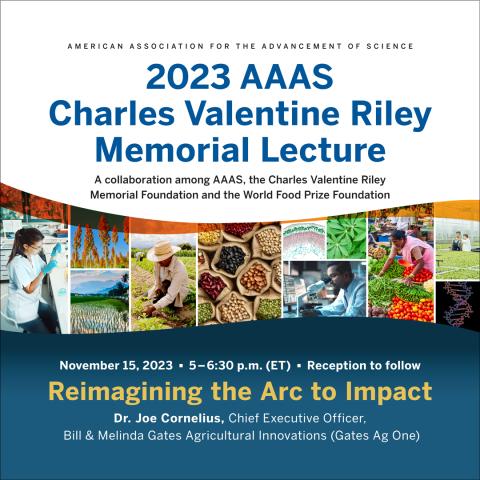
Harnessing scientific innovation can feed the planet effectively and efficiently, but farmers must be involved every step of the way, said the keynote speaker at the 2023 AAAS Charles Valentine Riley Memorial Lecture.
The annual lecture, co-sponsored by AAAS, the Riley Memorial Foundation and the World Food Prize Foundation, offers a platform to explore how agricultural innovations can address global environmental and societal challenges. The series, now in its 13th year, is named for the 19th century father of biological pest management and an early leader of AAAS’ biology section.
The Nov. 15 lecture and panel discussion, held in conjunction with AAAS’ 175th anniversary, looked back at how science and technology has impacted agriculture and ahead to how future innovations might tackle the twin challenges of food security and climate change.
Past approaches for boosting agricultural productivity – such as land expansion – “will not work going forward,” said Joe Cornelius, chief executive officer at the Bill & Melinda Gates Agricultural Innovations, a nonprofit also known Gates Ag One that aims to bring plant biology breakthroughs to small-scale farmers in sub-Saharan Africa and South Asia.
While the 20th century saw a “green revolution” spurred by agricultural research on high-yield crops, the last decade has seen lower productivity levels, he said.
“We’re not innovating fast enough. We’re not creating efficient systems. We’re not optimizing our agricultural systems in a way that will sustain a planet that is currently at 8 billion and on its way to 9,” said Cornelius.
Scientific advancement can pave a necessary path forward, he said.
Said Cornelius, “The greatest yield potential is the day you plant the seed. From that day forward, nature is doing everything in its power to take its piece of the pie. And nature doesn’t slow down, for us or for anyone else. And that’s why science and technology are so critically important.”
The agricultural research landscape currently sees scientists tackling a host of challenges, from restoring soil health to modifying plants to allow them to produce nitrogen through symbiosis to using robotic sensing and machine learning to automate processes, Cornelius said.
Yet the discovery itself is just one step of the process, he argued. Differentiating between invention, innovation and impact, Cornelius called for a focus on ensuring that technology is fit for purpose and deployed appropriately.
“How are we going to ensure that this great technology actually finds a way to create impact for farmers everywhere, for farmers in Nigeria, Ethiopia, Illinois, Iowa?” Cornelius asked lecture attendees.
“It starts with the farmer,” he said.
Products must be scalable and should be designed from their inception with a focus on the farmer, he said. Cornelius also suggested building local capacity, working with local experts and investing in open innovation systems that allow for the testing of products in a manner that advances research outcomes and accelerates the path to commercialization.
“Science is global, but actual development has to be local,” said Cornelius.
Panelists also weighed in how to ensure technological advancements in service of food production are farmer-focused while also promoting sustainability and biodiversity.
Saharah Moon Chapotin, executive director at Foundation for Food & Agriculture Research, emphasized the importance of establishing partnerships. Bringing together multiple parties – including competitors – to invest in agricultural research together can ensure that one company is not bearing the entire burden of funding innovations that the entire sector needs.
Sudip Parikh, chief executive officer of AAAS and executive publisher of the Science family of journals, also emphasized that a multidisciplinary, cross-sector approach is necessary to solve lofty challenges.
“Scientists cannot do it alone,” Parikh said, but he noted that lecture itself – which brought together attendees from government, academia, industry and the nonprofit sector – is a fertile opportunity for cross-sector collaboration.
Daniel Robison, president of the C.V. Riley Memorial Foundation and dean of the College of Agriculture and Life Sciences at Iowa State University, called for a more holistic approach. While the scientific advancements that fueled the green revolution of the 20th century simplified systems to meet production needs, the 21st century demands re-imposing complexity on our landscapes to promote sustainability.
Said Robison, “We don’t have to sacrifice productivity or profit.”
